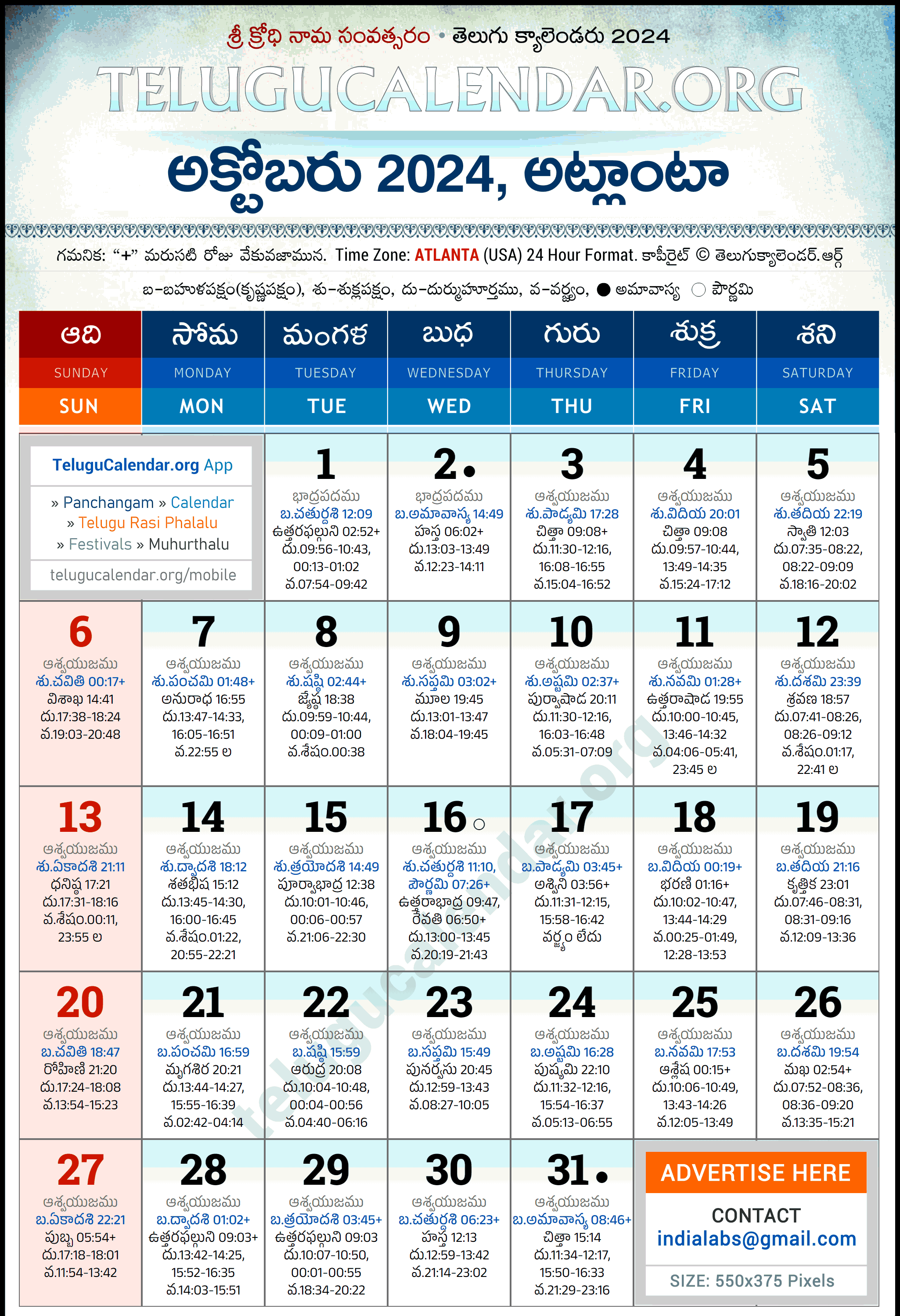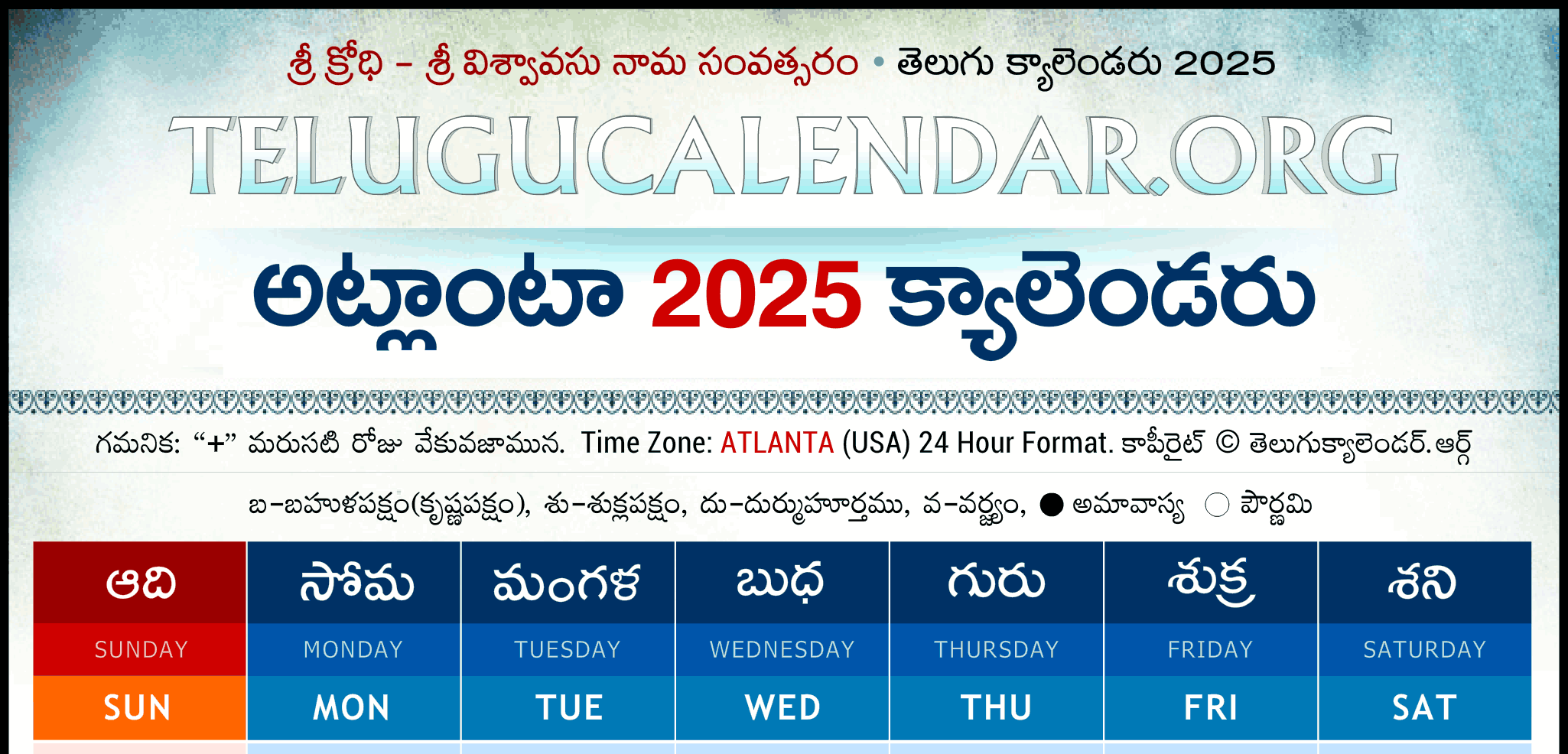
Introduction
Telugu calendar 2026 Atlanta represents a significant subject within its field, encompassing a range of practices, traditions, and applications that shape daily life and broader cultural landscapes for the Telugu diaspora. Understanding telugu calendar 2026 atlanta provides clarity about its background, its present relevance, and the way it continues to influence various aspects of society, particularly within a vibrant community far from its geographical origins. The calendar serves not merely as a time-tracking device but as a foundational pillar for cultural identity, religious observance, and community cohesion. Its principles guide countless decisions, from major life events to daily rituals, connecting individuals to their heritage in a profound manner.
Definition and Origin of Telugu Calendar 2026 Atlanta
The Telugu calendar is a lunisolar calendar, meaning it bases its calculations on both the cycles of the moon and the sun. This intricate system is one of several regional variations of the traditional Hindu calendar, primarily followed in the Indian states of Andhra Pradesh and Telangana, and by Telugu-speaking communities worldwide. Its origins are deeply rooted in ancient astronomical observations and Vedic traditions, with a history spanning millennia. The calendar’s structure is built upon the Panchangam, which comprises five main elements: Tithi (lunar day), Nakshatra (lunar mansion), Yoga (union of sun and moon), Karana (half of a Tithi), and Vara (day of the week). These elements are meticulously calculated to determine auspicious times for various activities and to mark festivals.
For the year 2026, the telugu calendar in Atlanta specifically refers to the application and interpretation of this traditional system by the Telugu community residing in the metropolitan Atlanta area. While the calendar’s fundamental calculations remain universal, its "origin" in Atlanta pertains to its adoption and sustained practice by a diaspora community. This involves accessing accurate Panchangam data, often through specialized almanacs or digital platforms, and adapting its observance to a Western context. The calendar system itself originated in ancient India, developed by astronomers and sages who observed celestial movements to create a sophisticated time-keeping mechanism deeply intertwined with religious and social life. Its migration to Atlanta signifies a cultural transplantation, where ancient wisdom finds new ground and continues to thrive through dedicated community efforts.
Importance of Telugu Calendar 2026 Atlanta Today
The importance of telugu calendar 2026 Atlanta extends far beyond mere chronological sequencing; it is a vital tool for cultural preservation and identity. For the Telugu community in Atlanta, the calendar serves as a spiritual compass, guiding the observance of religious festivals, fasts (Vrathams), and ceremonies (Pujas). It dictates the timing of significant cultural celebrations such as Ugadi (Telugu New Year), Sankranti, Diwali, and many others, ensuring that these traditions are maintained and passed down through generations. Without a reliable calendar, the synchronized celebration of these events, which forms the bedrock of community life, would be challenging.
Furthermore, the calendar plays a crucial role in personal planning. Auspicious timings (Muhurtams) derived from the Panchangam are sought for major life events, including weddings, housewarmings (Gruhapravesam), naming ceremonies (Namakaranam), and the initiation of new ventures. These timings are believed to ensure success and well-being, reflecting a deep-seated faith in cosmic influences on human endeavors. The calendar thus provides a structured framework that imbues daily life with spiritual significance and cultural continuity. It fosters a strong sense of community cohesion, as shared observances strengthen bonds among individuals and families, creating a supportive network for those living far from their ancestral land.
Benefits of Telugu Calendar 2026 Atlanta
The benefits derived from the consistent use of telugu calendar 2026 Atlanta are multifaceted, impacting cultural, spiritual, and social dimensions of life. One primary benefit is the robust preservation of cultural heritage. In a diverse and often assimilative environment like Atlanta, the calendar acts as a tangible link to Telugu traditions, language, and customs. It helps younger generations understand their roots and participate actively in cultural practices, preventing the erosion of identity.
Spiritually, the calendar offers guidance and peace of mind. By providing a clear schedule for religious observances, it enables individuals to align their lives with spiritual practices, fostering a sense of purpose and connection to the divine. The identification of auspicious times for important events reduces uncertainty and provides a framework for making significant life decisions with confidence. Socially, the calendar is instrumental in fostering community spirit. It facilitates the organized celebration of festivals and community gatherings, creating opportunities for interaction, networking, and mutual support among Telugu residents. These events are often vibrant showcases of traditional music, dance, food, and attire, enriching the cultural fabric of Atlanta. Economically, the calendar also indirectly supports local businesses that cater to the community’s cultural needs, such as Indian grocery stores, clothing boutiques, and catering services, especially during festive seasons.
Applications of Telugu Calendar 2026 Atlanta
The applications of telugu calendar 2026 Atlanta are extensive and permeate various aspects of daily and community life. Foremost among these is the scheduling of religious festivals. The calendar precisely marks the dates for major celebrations like Ugadi, which typically falls in March or April, signifying the start of the new year. Other key festivals include Maha Shivaratri, Sri Rama Navami, Krishna Janmashtami, Vinayaka Chavithi, Dasara, and Diwali, all of which are observed with great fervor by the Atlanta Telugu community. These dates are crucial for planning temple events, community programs, and family gatherings.
Beyond festivals, the calendar is indispensable for identifying auspicious dates (Muhurtams) for personal milestones. For example, families consult the Panchangam to determine the most favorable day and time for a wedding, ensuring that the union begins under propitious celestial influences. Similarly, the inauguration of a new home, the start of a new business, or the first feeding of a child (Annaprasana) are often planned according to these auspicious timings. The calendar also guides the observance of specific fasts and the performance of various pujas, detailing the correct Tithi and Nakshatra for each ritual. For community organizations and temples in Atlanta, the calendar is a foundational planning tool, allowing them to publish event schedules well in advance, coordinate volunteers, and ensure maximum participation from the community. It also serves as an educational resource, used to teach children about the significance of various festivals and the underlying principles of their cultural heritage.
Challenges and Future of Telugu Calendar 2026 Atlanta
Despite its enduring importance, telugu calendar 2026 Atlanta faces several challenges, particularly within a diaspora context. One significant challenge is maintaining relevance among younger generations who are primarily educated in Western systems and may not fully understand the intricacies of the lunisolar calendar. The cultural gap can lead to a disconnect from traditional practices. Another challenge involves the accessibility of accurate and localized Panchangam information. While global resources exist, specific timings for Atlanta, factoring in local sunrise/sunset and time zone differences, require careful calculation and reliable sources. Differing interpretations or regional variations of the calendar can also lead to confusion within the community.
The integration of the traditional calendar with the Gregorian calendar, which governs daily life in the United States, presents practical difficulties for scheduling and planning. Balancing work, school, and social commitments with traditional observances often requires careful navigation. Commercialization of cultural practices can also dilute the spiritual essence of the calendar. Looking to the future, the continued relevance of telugu calendar 2026 Atlanta hinges on several factors. Digitalization offers a promising path forward, with apps and online platforms making Panchangam data more accessible and user-friendly. Intergenerational transfer of knowledge through educational programs and community initiatives is crucial to ensure that traditions are not lost. Community organizations play a vital role in adapting celebrations to modern lifestyles while preserving core tenets. The future will likely see a blend of traditional observance with innovative approaches to keep the calendar alive and meaningful for generations to come.
FAQs about Telugu Calendar 2026 Atlanta
Q1: What is telugu calendar 2026 atlanta?
A1: Telugu calendar 2026 Atlanta refers to the traditional lunisolar calendar system followed by the Telugu-speaking community in the Atlanta metropolitan area for the year 2026. It is based on ancient astronomical calculations and guides religious festivals, auspicious timings, and cultural practices.
Q2: Why is telugu calendar 2026 atlanta important?
A2: It is important for cultural preservation, maintaining religious observances, guiding personal life events with auspicious timings, and fostering community cohesion among the Telugu diaspora in Atlanta. It connects individuals to their heritage and provides a structured framework for traditional living.
Q3: What are the main benefits of telugu calendar 2026 atlanta?
A3: The main benefits include preserving Telugu cultural identity, providing spiritual guidance, facilitating the planning of community events and personal milestones, and strengthening social bonds within the community. It helps transmit traditions to younger generations.
Q4: How can telugu calendar 2026 atlanta be applied in daily life?
A4: It can be applied by scheduling religious festivals, identifying auspicious dates (Muhurtams) for events like weddings or housewarmings, observing fasts and performing pujas, and as a resource for community organizations to plan their activities and cultural programs.
Q5: What challenges are associated with telugu calendar 2026 atlanta?
A5: Challenges include maintaining relevance among younger generations, ensuring the accuracy of localized Panchangam information, integrating traditional observances with Western daily life, and the potential for differing interpretations of calendar calculations.
Tips for Telugu Calendar 2026 Atlanta
To effectively utilize and appreciate telugu calendar 2026 Atlanta, several practical tips can be followed:
- Understand the fundamentals. Familiarization with the basic components of the Panchangam – Tithi, Nakshatra, Yoga, Karana, and Vara – provides a deeper understanding of the calendar’s calculations and significance. Resources such as traditional almanacs, online guides, or community elders can be valuable for this learning.
- Focus on practical use. Integrate the calendar into daily and family life by actively planning festival celebrations, identifying auspicious dates for important personal events, and observing traditional rituals. This hands-on application reinforces its relevance and cultural value.
- Stay updated on new trends or research. With the advent of digital technology, numerous apps and websites offer Telugu calendar information. Utilizing reputable digital resources can provide convenient and accurate access to Panchangam data, often with localized timings for Atlanta.
- Avoid common mistakes. Be cautious about relying on unverified sources for calendar information. Always cross-reference dates and timings with trusted almanacs or established community organizations to ensure accuracy, especially for significant events. Misinterpretations of timings can lead to errors in observance.
- Adopt a long-term approach. Encourage the integration of the Telugu calendar into family traditions, ensuring that knowledge and practices are passed down to future generations. Participating in community events and educating children about the calendar’s significance fosters a lasting connection to cultural heritage.
Conclusion about Telugu Calendar 2026 Atlanta
The continuing importance of telugu calendar 2026 Atlanta is undeniable, serving as a vital cultural, spiritual, and social anchor for the Telugu community in the region. It reinforces cultural identity, guides religious observances, and provides a framework for personal and community planning. Its significance extends beyond mere timekeeping, acting as a powerful link to ancient traditions and a source of cohesion in a modern, diverse environment. While challenges such as generational gaps and the integration with Western lifestyles exist, the inherent benefits of preserving heritage, fostering spiritual well-being, and strengthening community bonds far outweigh these difficulties. Through concerted efforts in education, digital adaptation, and community engagement, telugu calendar 2026 Atlanta is poised to remain a central element of progress and relevance, ensuring that its rich traditions continue to thrive and influence lives into the future.







Leave a Reply